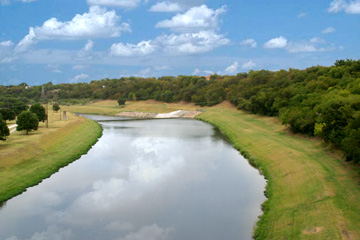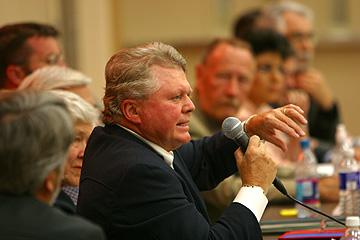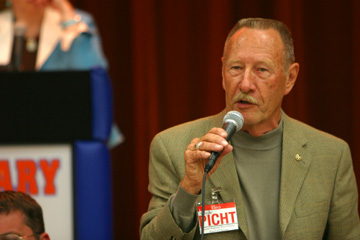 But when it’s the general manager himself who’s wining and dining on the public tab, who watches his expenses? That may be a $10,000 question for taxpayers.
But when it’s the general manager himself who’s wining and dining on the public tab, who watches his expenses? That may be a $10,000 question for taxpayers.
When Fort Worth Weekly reviewed water district expense records from October 2003 through November 2005, it found dozens of instances of spending at restaurants, bars, and one private club, totaling more than $10,000 and paid for by Oliver with the district’s credit card, that didn’t comply with the expense policy. Most receipts listed only an incomplete name or initials; in other cases, there were no names of those dining at all. In most cases, either no business purpose is listed, or it is suggested only by a cryptic word or two. For others, no receipt was submitted at all. All were signed by Oliver.
Take the $677.95 receipt for a meal at Sullivan’s Steakhouse in Austin in January 2005, at which Oliver was joined by four people. Who they were is a good question, since Oliver only listed initials on the back of the receipt, and the business purpose — “TWCA water laws” — is unclear. Then there’s the more than $3,000 worth of meals paid for at the Petroleum Club, one of Fort Worth’s oldest and most elite private clubs. No names of guests or even initials are listed, nor is any business purpose. A December 2004 internal memo says that there’s not even a receipt for a $318.24 meal for Oliver and two others during a San Diego conference.
Oliver might have been able to explain who his guests were at those meals, and what business was discussed. But he declined to answer any questions from the Weekly about his expense spending.
His no-response response to the Weekly’s questions also suggested that Oliver may be a little foggy on state law as well as water district expense policies. After insisting that the newspaper submit written questions rather than conducting a face-to-face interview, the general manager then wrote that he wasn’t answering any of the queries because they didn’t appear to be proper requests under the state’s open records law. Interview responses are not records and generally are not covered — much less required — by the statute.
 In fact, Oliver not only declined to answer questions himself, but he and his staff wrote that they would not pass the Weekly’s questions on to members of the elected board that governs the district. When the newspaper contacted them directly, several board members either didn’t return the reporter’s phone calls or declined comment.
In fact, Oliver not only declined to answer questions himself, but he and his staff wrote that they would not pass the Weekly’s questions on to members of the elected board that governs the district. When the newspaper contacted them directly, several board members either didn’t return the reporter’s phone calls or declined comment.
But at least one person on the water board won’t stand for Oliver’s unexplained expenses. Attorney and former Fort Worth City Council member Jim Lane, who was elected to the board this spring, said, “Those documents showed the [expense] policy wasn’t being followed. That’s all going to change, at least as long as I’m on the board.”
Until a couple of years ago, few people outside the offices of the Tarrant Regional Water District paid much attention to expense account spending or anything else having to do with the agency. For most of its 80-plus years, the water agency has operated largely below the radar, quietly monitoring dams, lakes, and portions of the Trinity River, working on flood control and recreational projects, and selling water to local cities and towns in 10 counties. As Lane said, most people in North Texas probably didn’t even know what the “TRWD” on their tax slips stood for.
But in 2003, the Fort Worth City Council adopted the Trinity River Vision Master Plan, the water district’s ambitious plan, to be paid for with federal and local tax dollars, that includes reconfiguring the river and its banks north and west of downtown. By creating a “Town Lake,” city leaders believe, the project will draw huge amounts of commercial and residential development to the area just over the Paddock Street Viaduct from downtown, while providing recreational opportunities and a riverwalk-type entertainment and retail area.
![Oliver: The Weekly’s questions ‘seem beyond the ... requirements of the [Texas Public Information Act].’](https://www.fwweekly.com/wp-content/images/stories/images/archive/2006-08-23/feature_pic1_8-23.jpg) The plan, developed with the help of Fort Worth’s Streams and Valleys group and consultants Gideon Toal Architects of Fort Worth and Bing Thom Architects of Vancouver, B.C., at first drew little opposition. But then the extent of the private land to be taken for the project (by eminent domain where needed) became clear, and in the last 18 months or so, business owners from White Settlement Road to North Main Street have expressed vehement opposition. The project was a major issue in the water board elections in May, drawing more candidates, controversy and voter turnout than the agency had seen in years. Besides Lane, a supporter of the project, the candidates included a former city council colleague, Clyde Picht, who opposed it. Lane and Marty Leonard, another Trinity Vision supporter, won, and the $450 million project now seems unstoppable. Chief among the project’s supporters has been U.S. Rep. Kay Granger — whose son, J.D. was hired by Oliver in April to manage the project’s implementation.
The plan, developed with the help of Fort Worth’s Streams and Valleys group and consultants Gideon Toal Architects of Fort Worth and Bing Thom Architects of Vancouver, B.C., at first drew little opposition. But then the extent of the private land to be taken for the project (by eminent domain where needed) became clear, and in the last 18 months or so, business owners from White Settlement Road to North Main Street have expressed vehement opposition. The project was a major issue in the water board elections in May, drawing more candidates, controversy and voter turnout than the agency had seen in years. Besides Lane, a supporter of the project, the candidates included a former city council colleague, Clyde Picht, who opposed it. Lane and Marty Leonard, another Trinity Vision supporter, won, and the $450 million project now seems unstoppable. Chief among the project’s supporters has been U.S. Rep. Kay Granger — whose son, J.D. was hired by Oliver in April to manage the project’s implementation.
“The water district has been around since 1922, spending taxpayer money, and no one [in the press] paid a bit of attention to what it was doing until Clyde Picht and I got into a shouting match this year,” Lane said.
The Weekly, at least, was paying a little attention before that: In fall 2005, the paper started asking questions about 1,200 acres of public property in Jack County that was being operated as a private hunting camp for water district workers and their guests. Some nearby property owners, environmentalists, and others questioned why the district-owned property was being used to benefit only the district’s employees and not the general public.
At that time, Oliver told the Weekly that upkeep and operation of the camp cost only about $2,000 to $3,000 a year above what the district would have spent on maintaining the property anyway. “It’s an employee benefit,” like health insurance, he said. Records showed about $7,000 worth of total spending on the camp in a 10-month period, but notations on who stayed at the camp and what kind of fees they paid were confusing and incomplete.
 At the same time that it asked for records on the hunting camp in December 2005, the Weekly also asked for employee expense reports under the state’s open-records laws. It took the district six months to get the expense records together, months longer than the other requested records — because, district officials wrote, credit card numbers and other nonreleasable information on the records had to be tediously blacked out by hand. The delay put release of the records well past the water board election date in May.
At the same time that it asked for records on the hunting camp in December 2005, the Weekly also asked for employee expense reports under the state’s open-records laws. It took the district six months to get the expense records together, months longer than the other requested records — because, district officials wrote, credit card numbers and other nonreleasable information on the records had to be tediously blacked out by hand. The delay put release of the records well past the water board election date in May.
What the records showed, once they were released — the $677 dinner for five, the two $500-plus dinners for unknown numbers of people, a $114 hotel mini-bar bill — probably wouldn’t have raised an eyebrow in the accounting offices of private companies. For taxpayers and public servants, however, they’re another matter.
Easily the biggest expense account bills were turned in by Oliver, the district’s general manager. They were also among the most problematic. Receipts either completely failed to meet the water district’s clear rules or provided only the briefest of notes in lieu of the required information.
In other ways, the receipts showed a pattern of spending that is more lavish than that charged off to taxpayers by officials in other local governmental bodies — expenses that nonetheless didn’t break any water district rules, because the district has no firm rules about how much its officials and workers are allowed to spend. The policy states only that the spending is to be “reasonable” — with the definition of reasonable determined by the general manager or his assistant.
In Oliver’s case, on 20 expense accounts totaling more than $6,000, he noted only the initials of guests rather than their names. On the back of a receipt for $555.36, for instance, he wrote seven sets of initials and one word — “NWRA” — to explain the “business purpose” of the meal.
 On two other receipts, for more than $500 each, there aren’t even any guests’ initials listed. The purpose: “TWCA Water Laws” — perhaps a legitimate reason for a business dinner, but difficult to tell, since Oliver would not provide further information.
On two other receipts, for more than $500 each, there aren’t even any guests’ initials listed. The purpose: “TWCA Water Laws” — perhaps a legitimate reason for a business dinner, but difficult to tell, since Oliver would not provide further information.
James Toal, of Gideon Toal, the local architectural firm involved in designing the TRV, was at three of the meals the district paid for (his was one of the few names that was written out).
In an e-mail, Toal said that the costs, which averaged $35 to $70 per person, were reasonable for nice restaurants in big cities. “We were always meeting with various important officials … who were giving of their time to help out the planning and implementation effort in Fort Worth,” he said.
One of the places Oliver took guests was Fort Worth’s Petroleum Club, where on 14 occasions in about a two-year period, he took large groups of people for lunch. Except for the $50 private room charge for each meeting, the prices were not outlandish — about $20 per person, on average. Did he take his staff out for lunch on the taxpayer tab every few months? Entertain the Trinity project planning committee? No way of knowing: There’s not a single business purpose, name, or even an initial listed on any of the Petroleum Club tabs.
For a couple of meals, Oliver submitted no receipts at all; memos reflect only the totals ($318 and $248, respectively), the event (a San Diego conference), and the initials of two people plus Oliver.
By comparison, Tarrant County rules allow a maximum $22 reimbursement for dinners if the employee or official is “engaged in official county business,” or up to $35 per person if guests are present. The City of Fort Worth provides a per diem rate that allows $18 to $31 for dinners. The Fort Worth school district’s top dinner reimbursement is $18.
Another point on which the district’s policy differs from city and county expense account rules is alcohol. The city and school district won’t pay for alcohol at all. The county won’t reimburse officials for liquor from in-room hotel mini-bars. But the water district’s policy doesn’t limit — or even mention — liquor. So Oliver broke no rules when he billed taxpayers for a $73 tab at a Woodlands hotel bar, for example, or $114 for items from the mini-bar in his Austin hotel room.
Trying to find out things like whether the water district executive had indeed spent $114 on peanuts and soft drinks from the mini-bar, the Weekly asked for an interview with Oliver. He declined to talk to a reporter in person but asked to be provided with written questions — an approach used often by wary officials.
The questions were e-mailed on Aug. 2. When no replies had been received after a week, the reporter checked back with the water district communications manager about the status. Oliver’s response, she was told, was coming not by phone or e-mail, but by mail.
The letter duly arrived, but it didn’t address any of the Weekly’s questions about the missing receipts, missing names, or missing explanations on his expense accounts. Instead, Oliver wrote in the one-page letter that no further explanation was needed. The reporter’s questions “do not appear to constitute requests for public information under the Texas Public Information Act,” he wrote, and “in most instances your queries seem beyond the scope of objective public disclosure and the requirements of the Act.”
It’s true that the questions were beyond the scope of the act — because the act doesn’t apply to requests for interviews. The Weekly’s questions didn’t ask for more records, but for information the district records didn’t contain.
Oliver also deflected questions meant for water district board members to the agency’s legal office. All further inquiries would also be forwarded to the legal department, he said. (When the Weekly contacted water board members directly, only Lane agreed to talk.)
Dallas media lawyer Charles Babcock said that while the state’s Public Information Act requires that the district provide records, it doesn’t necessarily stipulate that the records be explained or make sense. Nonetheless, he said, Oliver “should explain them, as a matter of public duty.”
Lane, shown a copy of the Weekly’s questions to Oliver, said they were “legitimate inquiries.” Taxpayers “have a right to know when [a dinner] was, who was there, what the business purpose is — you’re just asking them to comply with their policy,” he said.
Just jotting initials on the back of a receipt isn’t really what the policy seems to call for, Lane said, because the average taxpayer would have no idea what name was indicated. “If the purpose of the notations is public disclosure, then initials are not acceptable,” he said. “The policy is pretty clear, and the general public has a right to know.”
Comparing names on a list of water district employees to initials on the meal receipts didn’t help decipher much, but it did suggest that top water district administrators were the ones eating most of the meals. As for what business was conducted, that too is hard to say. “I’m just not sure how much business went on at those Petroleum Club lunches,” Lane said.
Both Picht and Lane said Oliver’s expense account spending isn’t necessarily that different from what happens elsewhere in business and politics — but that the average person isn’t aware of it.
Picht said that if it hadn’t been for the Trinity River Vision, the water district would probably still be in the shadows, escaping examination by either the press or its own board members. “They don’t want any scrutiny, and especially any scrutiny that would make some of their semi-nefarious doings public,” Picht said. “The water district is so closed-mouthed, there’s no open discourse.”
Staff writer Betty Brink contributed to this story.
You can reach Elizabeth Bassett at E.A.Bassett@tcu.edu.











